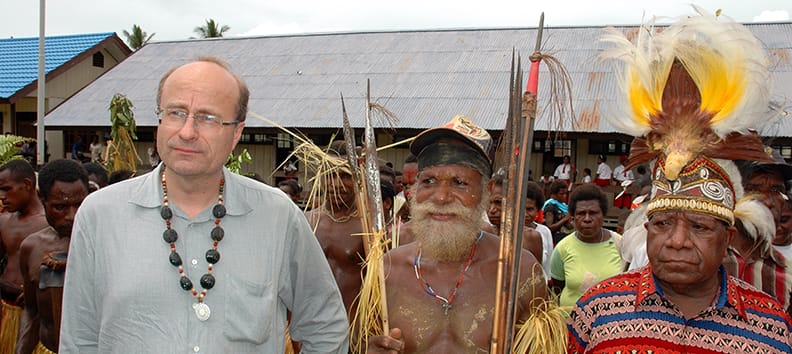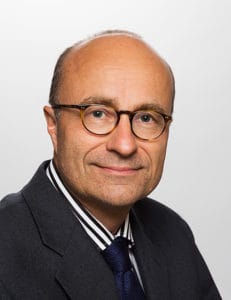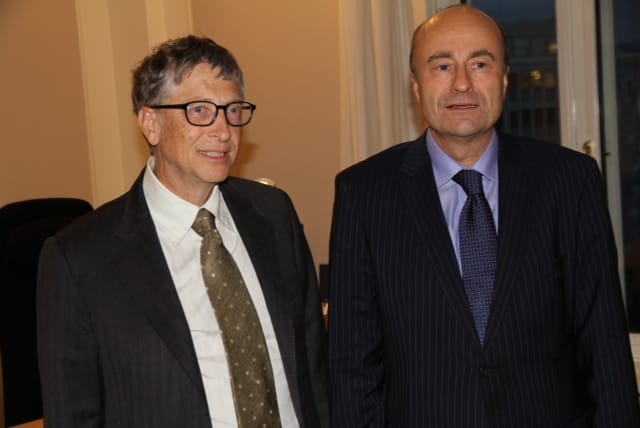Hans Brattskar: From Academic to Ambassador

It was the mid 1980s and Hans Brattskar was a professor in his native Norway. He was enjoying teaching management and economics courses at Østfold University College. He had recently become head of his department. A successful academic career lay before him. But Brattskar felt he needed something different. A new experience. An adventure.
So he entered the Foreign Service.
The decision to leave the classroom for the embassy led to decades of extraordinary experiences and lifelong lessons in international diplomacy. Over the course of 30 years and in visits to more than 80 countries, Brattskar helped to promote peace in countries like Sri Lanka and the Philippines; tackled global issues such as deforestation in the rainforests of Brazil and Indonesia; and met with powerful and influential figures including Bill Gates and UN Secretary-General Ban Ki-Moon as well as indigenous people in remote villages in Borneo and Papua New Guinea.
Today, the CGU alumnus (PhD, International Relations, 1987) represents Norway’s foreign policy as state secretary (deputy minister) for his country’s Ministry of Foreign Affairs.
“The reason I left [academia] was to try some new adventure, and it certainly has been a huge adventure,” Brattskar said. “But I also left because I felt that I would be a much more interesting teacher if I had some other experiences than just from academia.”

One memorable experience was the more than four years Brattskar served as ambassador to Sri Lanka during the early 2000s. Not only was the island nation at the time embroiled in a civil war that dated back to 1983, a tsunami that struck Sri Lanka in 2004 only exacerbated the chaos and death toll.
“I think that experience was probably the most intense I have ever had,” he said.
Brattskar helped facilitate peace negotiations between the Sri Lankan government and the Tamil Tigers and contributed to the efforts to rebuild the country in the wake of the tsunami, which led to the loss of more than 39,000 lives.
Brattskar also worked at the Norwegian embassies in Malaysia and Washington, D.C.; served as ambassador to Kenya, and was a special representative for his ministry’s peacebuilding operations as well as special envoy for the peace process between the government of the Philippines and insurgent forces.
But Brattskar took a five-year break from his diplomatic duties to tackle a broader, global issue: deforestation. Starting in April 2008, he started Norway’s International Climate and Forestry Initiative that works to reduce deforestation in developing countries and enable countries to reduce greenhouse gases, preserve biodiversity, and protect indigenous people.
A program that started out “with an empty desk and with some good colleagues” soon became an initiative with a $500 million budget that Brattskar described as “one of the most important climate efforts in the history of the world.”
Brazil has, with Norwegian support, been able to reduce deforestation in the Amazon by 75 to 80 percent, for example.
“To protect the rights of the indigenous people you have to also protect the rainforests of the world,” Brattskar said.
He said one his most gratifying experiences occurred in front of 2,400 people at the Lincoln Center in New York in September 2014. That was when he announced Norway’s establishment of a $100 million program to help indigenous peoples protect their rights in the rainforests of the world.
“That’s really the challenge and opportunity when you are in politics or if you are in diplomacy,” Brattskar said. “Look for areas where there is a need to do something important and where you believe you can make a difference.”
He noted that individual projects can become powerful short-term steps in the long-term goal of nurturing peace and goodwill between nations. For example, Norway is heavily involved in helping to rebuild a working state in Somalia.
“It is very important that people can see that peace efforts can also improve their lives,” Brattskar said. “One small but very visible thing that we did was to provide street lights in the capital of Mogadishu. It might have been a simple thing to do, but it was also something that was very important to many people.”
Brattskar is also currently engaged in global health issues with other governments and other partners, such as teaming up with the Bill & Melinda Gates Foundation to eradicate polio by 2018 and to reduce HIV/AIDS, tuberculosis, and malaria. Norway also recently launched an ambitious program called “Education for Development” that will emphasize education for girls.

He said learning about other cultures, meeting new people, and visiting different areas of the world have been highlights of his work.
“If you have a positive attitude and you meet people with respect, they will meet you with a positive attitude and give respect back,” he said. “So that is something I feel very fortunate about. It’s been a huge privilege for me.”
(Photo on homepage: “Hans Brattskar” by Kilian Munch is licensed under CC By 2.O, ©Kilian Munch)